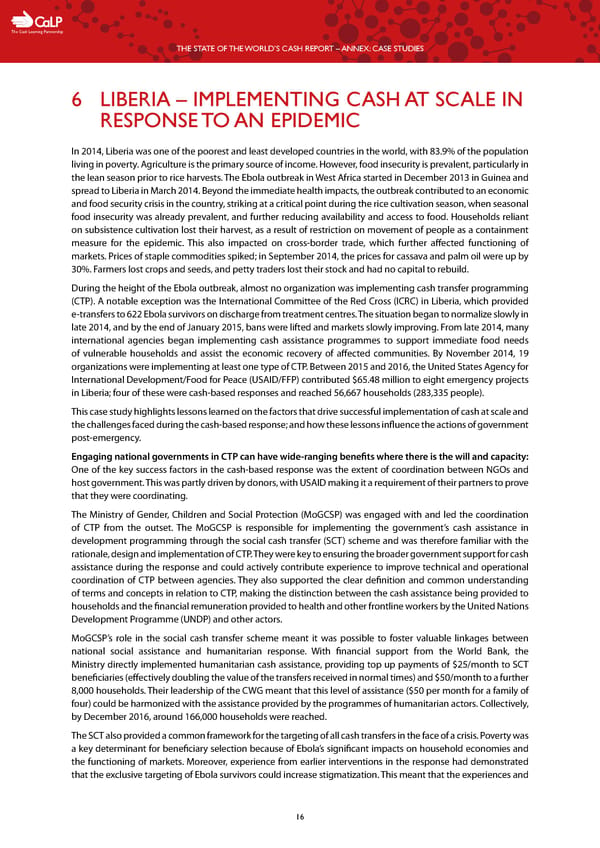C The Cash Learning Partnership THE STATE OF THE WORLD’S CASH REPORT – ANNEX: CASE STUDIES 6 LIBERIA – IMPLEMENTING CASH AT SCALE IN RESPONSE TO AN EPIDEMIC In 2014, Liberia was one of the poorest and least developed countries in the world, with 83.9% of the population living in poverty. Agriculture is the primary source of income. However, food insecurity is prevalent, particularly in the lean season prior to rice harvests. The Ebola outbreak in West Africa started in December 2013 in Guinea and spread to Liberia in March 2014. Beyond the immediate health impacts, the outbreak contributed to an economic and food security crisis in the country, striking at a critical point during the rice cultivation season, when seasonal food insecurity was already prevalent, and further reducing availability and access to food. Households reliant on subsistence cultivation lost their harvest, as a result of restriction on movement of people as a containment measure for the epidemic. This also impacted on cross-border trade, which further affected functioning of markets. Prices of staple commodities spiked; in September 2014, the prices for cassava and palm oil were up by 30%. Farmers lost crops and seeds, and petty traders lost their stock and had no capital to rebuild. During the height of the Ebola outbreak, almost no organization was implementing cash transfer programming (CTP). A notable exception was the International Committee of the Red Cross (ICRC) in Liberia, which provided e-transfers to 622 Ebola survivors on discharge from treatment centres. The situation began to normalize slowly in late 2014, and by the end of January 2015, bans were lifted and markets slowly improving. From late 2014, many international agencies began implementing cash assistance programmes to support immediate food needs of vulnerable households and assist the economic recovery of affected communities. By November 2014, 19 organizations were implementing at least one type of CTP. Between 2015 and 2016, the United States Agency for International Development/Food for Peace (USAID/FFP) contributed $65.48 million to eight emergency projects in Liberia; four of these were cash-based responses and reached 56,667 households (283,335 people). This case study highlights lessons learned on the factors that drive successful implementation of cash at scale and the challenges faced during the cash-based response; and how these lessons influence the actions of government post-emergency. Engaging national governments in CTP can have wide-ranging benefits where there is the will and capacity: One of the key success factors in the cash-based response was the extent of coordination between NGOs and host government. This was partly driven by donors, with USAID making it a requirement of their partners to prove that they were coordinating. The Ministry of Gender, Children and Social Protection (MoGCSP) was engaged with and led the coordination of CTP from the outset. The MoGCSP is responsible for implementing the government’s cash assistance in development programming through the social cash transfer (SCT) scheme and was therefore familiar with the rationale, design and implementation of CTP. They were key to ensuring the broader government support for cash assistance during the response and could actively contribute experience to improve technical and operational coordination of CTP between agencies. They also supported the clear definition and common understanding of terms and concepts in relation to CTP, making the distinction between the cash assistance being provided to households and the financial remuneration provided to health and other frontline workers by the United Nations Development Programme (UNDP) and other actors. MoGCSP’s role in the social cash transfer scheme meant it was possible to foster valuable linkages between national social assistance and humanitarian response. With financial support from the World Bank, the Ministry directly implemented humanitarian cash assistance, providing top up payments of $25/month to SCT beneficiaries (effectively doubling the value of the transfers received in normal times) and $50/month to a further 8,000 households. Their leadership of the CWG meant that this level of assistance ($50 per month for a family of four) could be harmonized with the assistance provided by the programmes of humanitarian actors. Collectively, by December 2016, around 166,000 households were reached. The SCT also provided a common framework for the targeting of all cash transfers in the face of a crisis. Poverty was a key determinant for beneficiary selection because of Ebola’s significant impacts on household economies and the functioning of markets. Moreover, experience from earlier interventions in the response had demonstrated that the exclusive targeting of Ebola survivors could increase stigmatization. This meant that the experiences and 16
 The State of the World's Cash | Case Studies Page 17 Page 19
The State of the World's Cash | Case Studies Page 17 Page 19